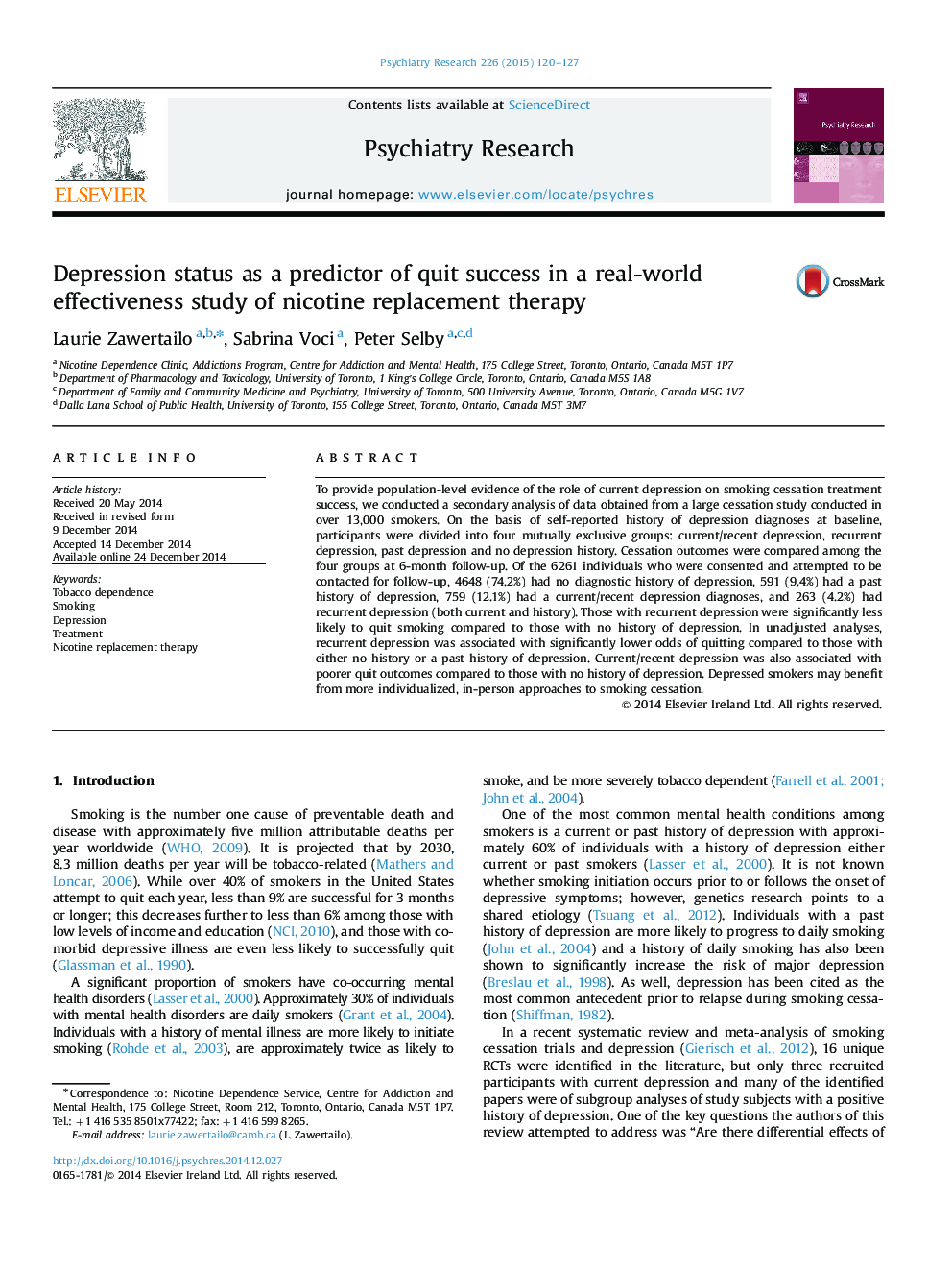| کد مقاله | کد نشریه | سال انتشار | مقاله انگلیسی | نسخه تمام متن |
|---|---|---|---|---|
| 10303779 | 545625 | 2015 | 8 صفحه PDF | دانلود رایگان |
عنوان انگلیسی مقاله ISI
Depression status as a predictor of quit success in a real-world effectiveness study of nicotine replacement therapy
ترجمه فارسی عنوان
وضعیت افسردگی به عنوان یک پیش بینی کننده برای موفقیت در یک مطالعه اثربخشی در دنیای واقعی درمان جایگزینی نیکوتین
دانلود مقاله + سفارش ترجمه
دانلود مقاله ISI انگلیسی
رایگان برای ایرانیان
کلمات کلیدی
وابستگی به تنباکو، سیگار کشیدن، افسردگی، رفتار، درمان جایگزینی نیکوتین،
ترجمه چکیده
برای ارائه شواهد جمعیتی در مورد نقش افسردگی فعلی در موفقیت درمان ترک سیگار، ما تجزیه و تحلیل ثانویه داده های به دست آمده از یک مطالعه بزرگ متوقف انجام شده در بیش از 13،000 سیگاری انجام دادیم. براساس سابقه افسردگی خود گزارش شده در ابتدای تشخیص، شرکت کنندگان به چهار گروه متقابلا منحصر به فرد تقسیم شدند: افسردگی فعلی / اخیر، افسردگی مجدد، افسردگی گذشته و بدون افسردگی. نتایج پس از پیگیری 6 ماهه در چهار گروه مورد مقایسه قرار گرفتند. از 6261 فرد مصاحبه کننده و سعی در تماس با آن برای پیگیری، 4648 (74.2٪) هیچ سابقه تشخیصی افسردگی نداشتند، 591 (9.4٪) سابقه افسردگی داشتند، 759 نفر (12.1٪) دارای افسردگی جاری / تشخیص افسردگی اخیر، و 263 (4.2٪) افسردگی مکرر (هر دو فعلی و تاریخ) داشتند. کسانی که افسردگی مجدد دارند، به میزان قابل توجهی کمتر به ترک سیگار در مقایسه با افرادی که سابقه افسردگی ندارند، کمتر است. در تجزیه و تحلیل های غیر قابل تنظیم، افسردگی مجدد با شانس به میزان قابل ملاحظه ای از ترک در مقایسه با افرادی که بدون سابقه یا سابقه افسردگی قبلی بودند، مرتبط بود. افسردگی فعلی / اخیر نیز در مقایسه با افرادی که سابقه افسردگی ندارند، نتایج منفی فقیرتر را در بر میگیرد. سیگاریهای افسرده ممکن است از رویکردهای فردی و شخصیتی بیشتر برای ترک سیگار استفاده کنند.
موضوعات مرتبط
علوم زیستی و بیوفناوری
علم عصب شناسی
روانپزشکی بیولوژیکی
چکیده انگلیسی
To provide population-level evidence of the role of current depression on smoking cessation treatment success, we conducted a secondary analysis of data obtained from a large cessation study conducted in over 13,000 smokers. On the basis of self-reported history of depression diagnoses at baseline, participants were divided into four mutually exclusive groups: current/recent depression, recurrent depression, past depression and no depression history. Cessation outcomes were compared among the four groups at 6-month follow-up. Of the 6261 individuals who were consented and attempted to be contacted for follow-up, 4648 (74.2%) had no diagnostic history of depression, 591 (9.4%) had a past history of depression, 759 (12.1%) had a current/recent depression diagnoses, and 263 (4.2%) had recurrent depression (both current and history). Those with recurrent depression were significantly less likely to quit smoking compared to those with no history of depression. In unadjusted analyses, recurrent depression was associated with significantly lower odds of quitting compared to those with either no history or a past history of depression. Current/recent depression was also associated with poorer quit outcomes compared to those with no history of depression. Depressed smokers may benefit from more individualized, in-person approaches to smoking cessation.
ناشر
Database: Elsevier - ScienceDirect (ساینس دایرکت)
Journal: Psychiatry Research - Volume 226, Issue 1, 30 March 2015, Pages 120-127
Journal: Psychiatry Research - Volume 226, Issue 1, 30 March 2015, Pages 120-127
نویسندگان
Laurie Zawertailo, Sabrina Voci, Peter Selby,
